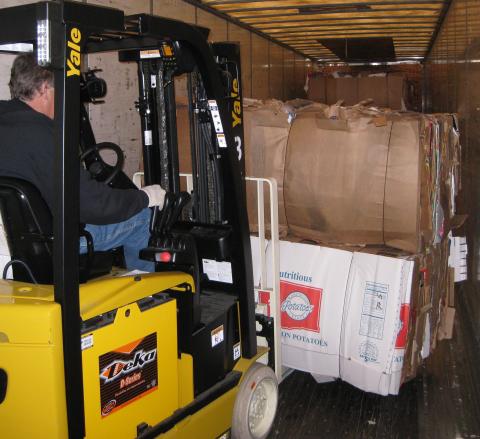‘DOING OUR PART’: Commissaries’ environmental mission extends past Earth Day

FORT LEE, Va. – Earth Day, April 22, may be celebrated once a year, but the Defense Commissary Agency’s efforts to employ sustainable work practices and recycle and divert waste from landfills is a year-round job.
“Our environmental management system is in our DNA,” said Kenneth Walker, DeCA’s chief, planning and programming division. “We continuously work to protect the environment. Whether recycling or donating edible but unsellable food to participating food banks, DeCA is fulfilling its role as a conscientious member of the military and global communities.”
DeCA’s EMS is the framework the agency uses to achieve its environmental goals. One element of the system is the agency’s food donation program, managed by its logistics directorate.
Since 2013, the agency has donated over 21 million pounds of food to food banks around the U.S. As of April 5, 174 commissaries donate to 198 food banks and pantries. In 2020 alone, DeCA donated 4.1 million pounds of food during the height of the COVID-19 pandemic, when food banks where stretched even further due to widespread financial hardship. Donating food also helps to reduce methane emissions from landfills, reducing DeCA’s carbon footprint.
The agency is also a yearly participant in the Department of Defense’s (DOD) Feds Feed Families campaign. The campaign encourages employees from all federal departments and agencies to give in-kind contributions – food, services, and time – to food banks and pantries. For the second year in a row, DOD has designated DeCA to be the lead for the annual campaign in partnership with the USDA.
Over the past 11 years, commissary customers and employees have paced DOD donations. To date DeCA has collected about 9.8 million pounds. In 2020 alone, DeCA patrons and employees led DOD contributions by collecting nearly 2.3 million pounds of food and personal hygiene items.
And it doesn’t stop there. Since 2005, commissaries have recycled or diverted an estimated 1.8 billion pounds of solid waste from ending up in landfills all across the world, generating an estimated $56.1 million in surcharge revenue, the fund that helps maintain, renovate and build new commissaries.
In fiscal year 2020, the agency recycled over 102 million pounds of recyclable commodities – 78 million in CONUS and 24 million OCONUS, respectively. DeCA recycles cardboard, plastic, wood pallets, metal, cooking grease, bones and fats, office paper, toner cartridges and organic compost. For perspective, recycling one ton of cardboard saves between 15-17 trees; for fiscal 2020, DeCA saved more than 3,000 trees.
DeCA also uses an equipment liquidation service to sell out-of-use items, which has diverted 1.5 million pounds of used equipment from landfills. The sale of these items has generated over $3.9 million for the surcharge account.
Even the agency’s buildings have been built or upgraded to ensure the carbon footprint of stores are reduced. Most commissaries have glass doors on refrigeration units, take advantage of natural light, use solar power units and LED lighting, and continue to convert or upgrade their HVAC units and other technologies to help conserve even more energy.
New low- to no-maintenance flooring installed in the stores helps to reduce the chemicals and equipment needed to strip and polish floors which reduces the overall cost to run stores. The program has helped reduce the agency’s annual energy usage every year since its inception in 2005.
DeCA’s EMS efforts also extend to commissary customers by providing shoppers with sustainable options when they shop. They can purchase quality reusable shopping bags, energy efficient light-emitting diode (LED) lightbulbs, high-efficiency (HE) dish and laundry detergents and reduced-packaging products like paper towels and bathroom tissue without cardboard tube inserts.
Organic products are available ranging from meats, produce, dairy products, baby food, and dog and cat foods. Bio-based products, green cleaners, and energy- and water-efficient equipment can also be found in the product lineup.
“Customers looking for great deals on green items for their homes need to look no further than their commissary shelves,” said Bonita Moffett, DeCA’s director of sales. “We have soaps and cleaners you can trust to clean your home, protect the environment and save you money. Be on the lookout for coupons – digital and paper – to help you save even more.”
The agency’s EMS allows it to balance the delicate task of protecting the environment and meeting DeCA’s business goals, Walker said.
“We are always trying to find new and more innovative ways to reduce, recycle and conserve energy,” said Walker. “Improving the EMS and employing new practices ensures that we are always working to be the best steward of natural resources that we can be. It allows us to serve our customers with the confidence that we are doing our part to conserve natural resources for future generations of commissary shoppers.”
-DeCA-
PHOTO CAPTION: A DeCA employee at the Fort Lewis Commissary collects recycled cardboard. (DeCA photo)
About DeCA: The Defense Commissary Agency operates a worldwide chain of commissaries providing groceries to military personnel, retirees and their families in a safe and secure shopping environment. Commissaries provide a military benefit, saving authorized patrons thousands of dollars annually on their purchases compared to similar products at commercial retailers. The discounted prices include a 5-percent surcharge, which covers the costs of building new commissaries and modernizing existing ones. A core military family support element, and a valued part of military pay and benefits, commissaries contribute to family readiness, enhance the quality of life for America’s military and their families, and help recruit and retain the best and brightest men and women to serve their country.
